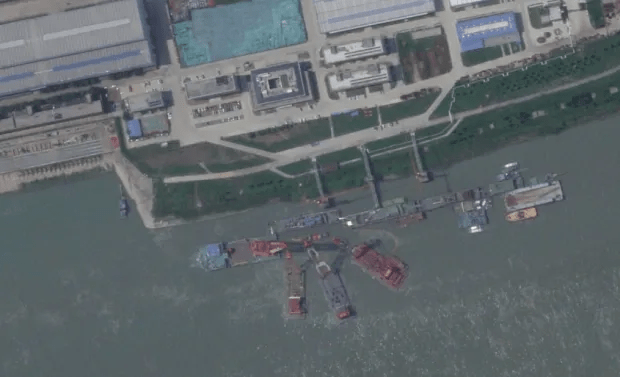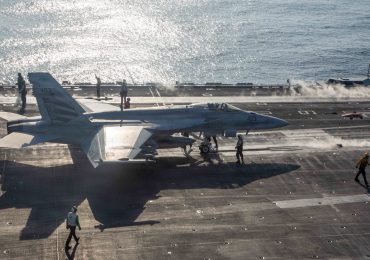CHINA could be covering up a devastating radiation leak after its latest nuclear submarine sunk in a huge disaster, a security expert has warned.
The worrying sinking of China’s most sophisticated Zhou-class vessel near Wuhan has sparked major long-term nuclear radiation threats that could be of “great international concern”.
Planet LabsSatellite imagery from June of what appears to be floating cranes at a shipyard near Wuhan where the Chinese Zhou-class submarine sank earlier this year[/caption]
Planet LabsThe same site picturd a month earlier[/caption]
Chinese authorities were reportedly left scrambling to try and conceal the military disaster to hide one of their newest weapons programs from foreign officials.
The vessel was part of Beijing’s big arsenal of nuclear attack submarines with state-of-the-art technology.
But the sinking corpse of the sub was reportedly uncovered by US officials through satellite imagery which showed it being sneakily salvaged from a shipyard near Wuhan in early June.
Large floating cranes were seen on satellite images arriving in Wuhan back in June, sparking fears as to why the unusual cranes were patrolling the pier where naval activity is known to take place.
Neither China’s People’s Liberation Army (PLA), nor the Communist Party of China (CCP) have acknowledged the humiliating blunder that took place last May or June.
A Chinese embassy spokesperson in Washington told Reuters: “We are not familiar with the situation you mentioned and currently have no information to provide.”
Ashok Swain, a professor of peace and security expert at the University of Uppsala, said there could have been a nuclear leakage at the time of the attack – and China not accepting the blunder is a “real problem”.
While many officials in the West are still unsure if the submarine was carrying nuclear fuel on board at the time it sank, several experts outside of the Pentagon have speculated that it more than likely was.
They are also yet to rule out the possibility that military personnel or those working on the sub were killed or injured when it sank.
And Mr Ashok said that China not revealing the toxic water reports is a “matter of international concern”.
He told The Sun: “This sort of thing is not just an ordinary accident. It involves nuclear submarines. When these accidents take place in the water particularly, it can potentially affect a larger community.
“If there is a leak, we will see the radiation moving to the other parts fo the word througn mvoing waters.
“It is a matter of international concern. If there truly was some kind of leakage, then we have long-term threats.”
Mr Ashok Swain also that said China’s rush to win the arms race could have caused other blunders, but the unaccountable regime under President Xi Jinping makes it difficult to find out the truth.
He added: “There could be more Chinese military accidents that we are not aware of.
“When you are in a rush to develop modern milliatry technolgy without any public accountability or media accountability, you continue to make this kind of mistakes.
“We don’t know exactly what happens unless there is an independent investigation [in the west] we do with the satellite images.
“We only know [secondary information] that comes out late. And by that time a lot of things could be [covered up].”
HUMILIATING SETBACK
The expert also said that sinking of its newest submarine may have caused China a setback from a milliatry perpective – besides the worldwide humilation the blunder has caused.
But it wont deter the PLA from developing more such technologies, he warned.
Brent Sadler, a retired US Navy nuclear submarine officer, said the major error in letting it sink has slowed down Chinese military efforts in the months since.
Sadler, now a a senior research fellow at Washington think tank Heritage Foundation, called it a “significant” moment.
A senior US defence official explained: “It’s not surprising that the PLA Navy would try to conceal the fact that their new first-in-class nuclear-powered attack submarine sank pierside.
“In addition to the obvious questions about training standards and equipment quality, the incident raises deeper questions about the PLA’s internal accountability and oversight of China’s defense industry, which has long been plagued by corruption.”
The Zhou-class model that sank is the latest in a fresh set of Chinese nuclear-powered submarines.
Thomas Shugart, a former US submarine officer, was one of the first to speak about the sub disaster after analysing the satellite images.
He said that despite the Zhou-class vessel being rescued from the depths it will be out of action for some months to come.
Shugart said: “The whole boat would be full of water.
“You’d have to clean out all the electronics. The electric motors may need to be replaced. It would be a lot of work.”
“You’d have to clean out all the electronics. The electric motors may need to be replaced. It would be a lot of work.”
It comes less than a year after a similar sub blunder took place in China.
Tragedy struck in October 2023 when 55 Chinese sailors were feared to have died after their nuclear submarine reportedly got stuck in its own trap and they ran out of oxygen.
The sub was snared by it’s own chain and anchor device meant to catch Western vessels lurking off China’s coast, according to UK intelligence.
The crew are said to have suffocated to death onboard after the 351ft Shang class type-093 sub’s oxygen systems failed.
Despite the rumours Beijing said that news of the sub’s destruction was “completely false”.
Getty – ContributorA type 094 Jin-class nuclear submarine used by the Chinese People’s Liberation Army Navy as they look to bolster up their fleet[/caption]
APA PLA soldier during a military exercise[/caption]
China has the world’s biggest army – with over two million active personnel
Leave a comment








